|
|
|
Sort Order |
|
|
|
Items / Page
|
|
|
|
|
|
|
| Srl | Item |
| 1 |
ID:
097793
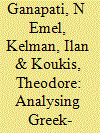

|
|
|
|
|
| Publication |
2010.
|
| Summary/Abstract |
This article contributes to the disaster diplomacy literature in examining the conditions under which disasters can lead to long-term disaster-related collaboration (e.g. in disaster response, recovery or risk reduction) at both governmental and non-governmental level among states in conflict. In particular, the article focuses on the role of the 1999 earthquakes in enhancing such collaboration between Greece and Turkey over the past decade. While acknowledging the diversity and complexity of disaster diplomacy situations, the article suggests that disasters can lead to long-term disaster-related cooperation among states in conflict when: (1) one party providing disaster relief to another party is followed by a similar reciprocal gesture (i.e. tit-for-tat diplomacy); (2) there is a realization and acceptance that neighbours should come to each other's assistance in times of disaster; and (3) there is an enabling broader context (e.g. a rapprochement process) conducive to sustaining the long-term cooperation.
|
|
|
|
|
|
|
|
|
|
|
|
|
|
|
|
| 2 |
ID:
109875
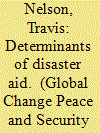

|
|
|
|
|
| Publication |
2012.
|
| Summary/Abstract |
This article examines the motivations behind the provision of disaster aid. Is this aid provision driven more by 'humanitarian' variables such as the severity of the political or natural emergency in the recipient state or 'political' variables such as the economic or strategic interest of the donor state? Through a statistical analysis of the aid activity of 22 donor states between 1997 and 2008, it is found that, contrary to much of the literature on humanitarian aid in general, humanitarian variables are consistently significant predictors of disaster aid provision. However, certain political variables are also significant, in that donor states provide more disaster aid to trading partners, former colonies, and military allies.
|
|
|
|
|
|
|
|
|
|
|
|
|
|
|
|
| 3 |
ID:
184187
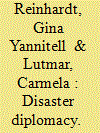

|
|
|
|
|
| Summary/Abstract |
The COVID-19 pandemic has drawn worldwide attention to the difficulties inherent in managing disasters. Scholars across disciplines have been forced to consider the impact disasters have on interstate relations, state resilience, patterns of violence and hostility, and the vulnerabilities that condition conflict. This special issue offers new insights to help disentangle the relationship between disasters, conflict, and cooperation, by adhering to a three-pronged theoretical framework. First, all pieces in this issue are underpinned by a unified understanding of disasters as endogenous social phenomena. Second, we acknowledge that disasters occur as processes rather than discrete events. Finally, we explore the possibility that disasters and conflict are co-determined by a common set of factors. The articles herein were chosen not only because they advance academic thought about the disaster–conflict nexus, but also because of their potential to advance the practical impact of this line of research on the global conflict and disaster landscape. We highlight the relevance of this special issue for further work investigating the effects of conflict on disasters and the relationship between the hazards cycle process and patterns of violence and hostility, as well as the implications of adopting this suggested framework for policymaking and data collection.
|
|
|
|
|
|
|
|
|
|
|
|
|
|
|
|
| 4 |
ID:
138771


|
|
|
|
|
| Summary/Abstract |
Recent conflict research acknowledges the long-ignored intertwined nature of social conflict and environmental vulnerability; findings show that natural disasters affecting conflict regions can catalyse pre-disaster conflict developments. It is, however, unclear why disasters sometimes contribute to conflict escalation and sometimes to mitigating conflict. Drawing from the contrasting post-tsunami experiences of Sri Lanka and the Indonesian province of Aceh, this article investigates the tipping effects and asymmetrical impact of international relations, political participation and economic sustainability on post-disaster peacebuilding. Evidence shows that the domestic capacity for peacebuilding critically depends on the nature of international support. While Sri Lanka and Indonesia have many similarities, the latter’s major geopolitical relevance guaranteed sufficient, credible and targeted peacebuilding support, while the former received limited support and faced competing internal demands from Tamil and Sinhalese areas, thereby further restricting the potential for effective peacebuilding.
|
|
|
|
|
|
|
|
|
|
|
|
|
|
|
|
| 5 |
ID:
074525


|
|
|
| 6 |
ID:
127892
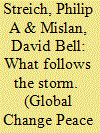

|
|
|
|
|
| Publication |
2014.
|
| Summary/Abstract |
In the last decade the concept of disaster diplomacy has drawn interest to the links between major natural disasters and international conflict. This paper reviews the disparate set of works covering this relationship. This body of work, which draws on multiple disciplinary traditions extending over three generations, holds vast potential for political scientists that seek to understand the intersection of ecological catastrophe and politics. The latest wave of publications has the greatest potential to yield valuable and generalizable insight into political phenomena as well as to produce practical knowledge for disaster-related organizations and agencies, policymakers, and citizens. This paper reviews the three generations of literature and then makes suggestions along three lines of argument: (1) refining definitions of variables, (2) refining the concept of 'disaster diplomacy', and (3) using existing theories and concepts of interstate conflict.
|
|
|
|
|
|
|
|
|
|
|
|
|
|
|
|
| 7 |
ID:
096681
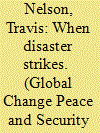

|
|
|
|
|
| Publication |
2010.
|
| Summary/Abstract |
This article asks under what circumstances natural disaster can lead to interstate conflict initiation. Through an analysis of all major earthquakes, floods, storms, and tsunamis between 1950 and 2006, I find that serious disaster increases the general likelihood of conflict initiation, and I reach two key conclusions about the specific causal mechanisms driving post-disaster conflict. First, I show that there is not a single instance of a rival or opponent state taking the opportunity to initiate military conflict in the aftermath of serious disaster. This finding supports the developing literature on 'disaster diplomacy'. Second, there are, however, cases in which states with a recent history of significant civil disruption initiate such conflicts themselves. In these situations, disaster can contribute to the conflict environment and can make conflict initiation significantly more likely. I find that, counter-intuitively, it is the very states most vulnerable and most weakened by disaster that are likely to initiate conflict in a post-disaster environment.
|
|
|
|
|
|
|
|
|
|
|
|
|
|
|
|
|
|
|
|
|